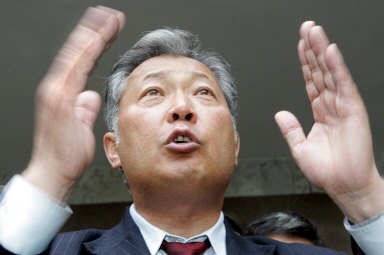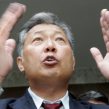
MOSCOW HOPES CRISIS WILL DRIVE BAKIYEV BACK INTO RUSSIAN CAMP
Publication: Eurasia Daily Monitor Volume: 3 Issue: 207
By:

The political and constitutional crisis in Kyrgyzstan is undermining the rule of President Kurmanbek Bakiyev and Prime Minister Felix Kulov, who came to power last year as the result of the “Tulip Revolution” in March 2005, which ousted former president Askar Akayev (see EDM, November 7). The opposition “For Reforms” movement controls parliament and accuses Bakiyev of corruption and nepotism. Yesterday, a majority of Kyrgyz parliamentarians proclaimed a new constitution that effectively stripped Bakiyev of most of his executive powers. Bakiyev refused to recognize the legitimacy of the new constitution and threatened to dissolve parliament. Street protests in the capital, Bishkek, turned violent, with riot police attacking protesters with tear gas and batons. There have been reports of armored personnel carriers and troops deployed in the center of Bishkek, while there are other reports that Bakiyev has agreed to partially relinquish power (Interfax, November 7).
The apparent replay of yet another “color revolution” in a former Soviet republic — like the 2003 “Rose Revolution” in Georgia and the 2004 “Orange Revolution” in Ukraine — has not played well in Moscow. Washington and Western NGOs have been widely believed to be the main sponsors and direct promoters of the color revolutions within the Commonwealth of Independent States, including the Kyrgyz events of 2005 (strana.ru, November 7; Asia Times November 6).
The main aim of these revolutions, as seen from Moscow, is the lessening of Russian influence within the former Soviet space and the extension of U.S. imperial power. The speaker of the Duma, the lower house of the Russian parliament, Boris Gryzlov — a close cohort of Russian President Vladimir Putin from St. Petersburg — told reporters that in Kyrgyzstan an attempt to change the system of government through street demonstrations will end badly. “Rose Revolutions always end up on their own bayonets,” announced Gryzlov. “The Orange Revolution in Ukraine did not bring the people any changes for the better.” The deputy Duma speaker, flamboyant nationalist Vladimir Zhirinovsky, who always closely rehearses his political statements with Kremlin insiders, announced that he had personally called on Bakiyev to use armed force to suppress opposition demonstrators in Bishkek (Interfax, November 7).
Gryzlov, like most members of the ruling Russian elite, apparently sincerely believes that the establishment of a free press and uncensored television and democracy in Ukraine after the Orange Revolution is nothing good, but rather a sign of weakness, while the elimination of press freedom and democracy in Russia under Putin is good — a symbol of the reestablishment of a strong state. The Rose Revolution in Georgia has brought meaningful reform, economic growth, less corruption, and more democracy, but the Russian press is full of stories of the dismal failure of the Rose, Orange, and other color revolutions.
It is clear that Moscow hopes Bakiyev will find ways to suppress the present unrest and would not oppose his use of brute force. In 2005 Uzbek President Islam Karimov used troops and machineguns against unarmed civilians to suppress an anti-government uprising in Andijan in the Fergana Valley. The West called for an independent investigation of the carnage in Andijan and imposed limited sanctions on Uzbekistan. The Kremlin fully supported Karimov, who in return closed the U.S. airbase in Karshi, which had been used in operations in Afghanistan, and brought Uzbekistan back into Moscow’s fold. Karimov signed a defense treaty with Putin, and Uzbekistan once again reinstated its membership in the Collective Security Treaty Organization, a Moscow-lead post-Soviet defense alliance.
The United States still has a military airbase near Bishkek, which was established after 9/11 and is also used to support anti-terrorist operations in Afghanistan. If Bakiyev uses military force to suppress street demonstrations and the majority of parliament, the regime will lose international credibility and will be forced to become a Russian client. The U.S. base near Bishkek would most likely close, which would effectively end the post-9/11 U.S. military presence in the former Soviet Central Asia.
The Russian military have always regarded a Western and especially U.S. military presence in Central Asia with great annoyance and suspicion. In Soviet times as well as today, Central Asia in general — and Kazakhstan in particular — was the primary testing ground for major weapon systems. The main Russian space launch center at Baikonur (Tura-Tam) in Southern Kazakhstan is the main site from which liquid-fuel intercontinental ballistic missiles (SS-18s and SS-19s) are regularly test-fired into the Kamchatka warhead receiving facility. Regular tests of Russian anti-aircraft, strategic, and theater MD missiles are carried out in Northern Kazakhstan.
Russian military leaders believe the deployment of U.S. forces in Central Asia provides the West with a unique opportunity to gather sensitive intelligence information. The strengthening of U.S. influence in Central Asia could, in the end, prevent Russia from using unique Soviet-built military facilities, like the naval torpedo testing base on Issyk Kul Lake (Kyrgyzstan), the Okno space-monitoring facility in Nurek (Tajikistan), as well as Tura-Tam and Kazakh missile testing sites. Military circles in Moscow also fear that, in the future, the United States might deploy missile defense capabilities in Central Asia to strike down Russian ICBMs during the highly vulnerable boost phase after take-off.
Putin tacitly allowed the U.S. military into former Soviet Central Asia in 2001, but since then the political climate in Moscow has changed. A suppression of the opposition in Bishkek, especially if followed by the closure of the last significant Western military base in the region, would be hailed as a major foreign policy victory and further evidence that Russia is reestablishing itself.
Will Bakiyev have the nerve to use force, or will he somehow compromise? Will the Kyrgyz military and special forces act decisively, if they get the order? Much depends on the outcome of the Bishkek political fray. Moscow regards each successful democratic color revolution within the former Soviet space as a rehearsal of a possible future Western bid to oust Putin or his chosen successor. That is why its essential that any color revolution is pronounced a failure.




